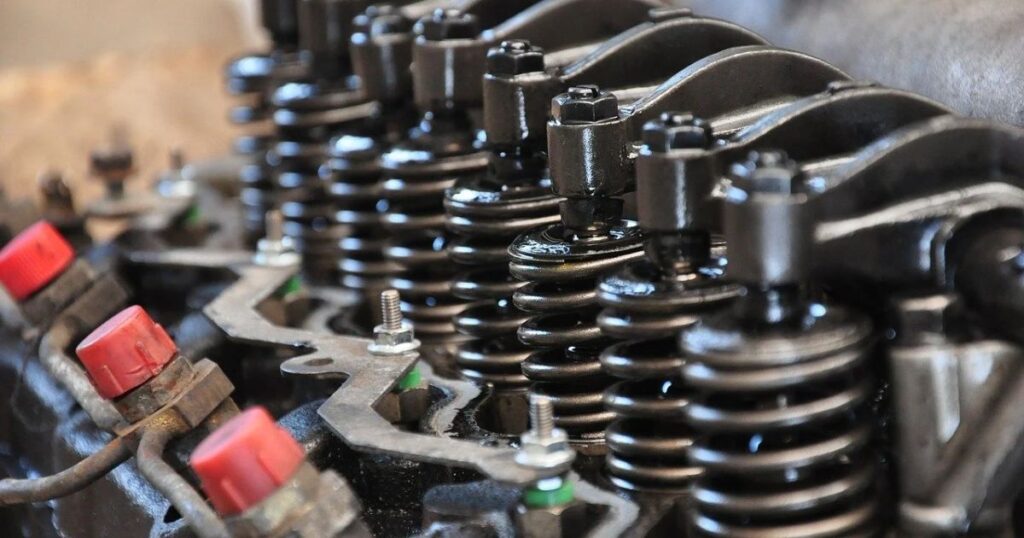Every car owner dreads certain sounds coming from under the hood. One noise that can cause concern is a ticking sound from the engine on a cold start. However, there is usually no need to panic as ticking when cold may be normal, depending on the cause.
So, why is your engine ticking when cold? Here are a few potential reasons why a car might tick briefly after a cold start:
- Damaged, Loose, or Sticking valve lifters
- Intentional ECM design
- Oil level/pressure too low
- Bearing wear
- Valve guide/seal wear
- Exhaust gasket leak
Ticking upon a cold start that disappears within a minute is usually considered normal. However, persistent or loud noises should not be ignored, so listening for changes over time is wise preventative maintenance.
A Table of Possible Reasons Why Is Your Engine Ticking When Cold
Here is a summary of the reasons why your vehicle’s engine is ticking when cold and their best solutions.
| Possible Cause | Solution |
| Damaged, Loose, or Sticking valve lifters | Add oil additive, check oil level/pressure, inspect lifters, replace worn/damaged lifters, adjust valve lash clearance, replace hydraulic lifters |
| Intentional ECM design | No repairs needed if ticks for under 50 seconds as per ECM programming |
| Oil level/pressure too low | Check and top up oil level, inspect oil condition, change oil if dirty, use proper oil viscosity, check for leaks and fix |
| Bearing wear | Check oil level/change oil, inspect for metal flakes, take to mechanic for diagnosis/potential bearing replacement |
| Valve guide/seal wear | Inspect guides and seals, replace worn guides/seals, follow manufacturer specs for clearances |
| Exhaust manifold gasket leak | Inspect gasket for cracks, clean flanges, use new gasket with sealer, replace manifold if warped |
Why Is Your Engine Ticking When Cold?
That repetitive engine tapping is enough to fray anyone’s nerves, leaving you to fret over the health of your trusty steed. As the owner of many vehicles, I understand the concern well.
Usually, the source of the ticking noise on cold start is mechanical, resulting from typical fatigue or intentional design. While sometimes signalling escalating degradation, ticking upon ignition can also just be an attribute of the machine. Here are a few possible reasons to answer your questions – why does my engine tick until it warms up?
Damaged, Loose, or Sticking valve lifters

Valve lifters help open and close the engine’s valves precisely to allow fuel/air intake and exhaust. Lifters contain a hydraulic system to maintain clearance from the cam lobes as parts wear. Damaged, loose, or sticking lifters can cause issues.
Due to wear, damaged lifters may not retain proper clearance from the cam lobes. Loose lifters may excessively tap against lobes, creating noise. Sticking lifters prevent valves from fully opening/closing, disrupting fuel/airflow.
This can lead to ticking when the engine is cold from parts warming and expanding into place. It might also be the oil hasn’t reached the lifter during cold start, as has been experienced with 2019-2020 Cadillac, Chevy, and GMC cars.
Solution:
- Add an oil additive to break up sludge that may restrict lifter movement
- Check that the oil level is sufficient and topped up and that the oil pressure is within specs
- Remove the valve cover to inspect lifters for damage or excess wear by rotating the camshaft
- Replace any worn or damaged lifters found
- Adjust valve lash clearance if specified by the engine manufacturer
- Replace hydraulic lifters if leaking fluid causes sticking or weak hydraulic action
Intentional ECM design
Some vehicles have designed cold engines ticking into the engine control module’s (ECM) programming. According to a GM technical service bulletin, certain GM V8 engines from 2009-2015 are programmed this way to assist with cold start emissions standards.
When starting a cold engine, the ECM intentionally holds the initial ignition timing for up to 50 seconds. This allows combustion to occur in the exhaust manifold, producing the ticking sound. Models affected include some Chevy, GMC, and Cadillac vehicles equipped with 6.0L or 6.2L V8s.
Solution:
- No repairs are needed if the ticking happens for 50 seconds or less upon a cold start, as this confirms it is the intended ECM operation.
- Ensure the ticking sound matches the timing and conditions outlined in the technical service bulletin.
- Take note if the ticking persists for longer than 50 seconds, as this may indicate an underlying issue beyond the programmed ECM response.
Oil level/pressure too low
When you cold start the engine, the engine oil is thicker and more viscous. It will take a few seconds to flow to all the engine components. Lifters and valves rapidly click, tick, or clack during these seconds as the viscous oil struggles to properly lubricate the parts.
If the oil level is also low, this increases the risk of these parts not getting proper lubrication. When the level is low, the oil pump will take even longer to generate enough pressure to push the oil throughout the engine. This further exacerbates the ticking sounds as the engine is started cold.
Solution:
- Check the oil level using the dipstick and top up if needed. The oil level should be between the minimum and maximum marks.
- Inspect the oil for its color and condition. Dirty or dark oil indicates it needs changing. Change the oil if it’s due.
- Use the recommended viscosity and type of oil for your vehicle as per the owner’s manual. Using too thin an oil can lead to low pressure.
- Check for any oil leaks under the car. Fix any leaks that are found to prevent oil loss.
- Potential causes for low pressure include a clogged oil filter, worn-out bearings, or a pump. Get specific components inspected and replaced if identified as a problem.
- Allow sufficient time for the oil to circulate and reach operating pressure when cold starting. The ticking should reduce as warm-up occurs. Seek repairs if it persists after normal warm-up.
Bearing wear

Gradually worn engine bearings can cause momentary ticking noises due to increased clearances between components. As bearings wear over time, their surfaces become smoother, and the spacing between the crankshaft/connecting rod and their bearing shells widens.
When cold, parts may rub together in these larger gaps, producing faint ticking until everything expands during warm-up. Early signs include:
- metallic particles in the oil,
- grinding at idle from the bottom end,
- low oil pressure, and
- vibration after the noise stops.
Solution:
- Check the oil level is correct and change if it is old or contaminated.
- Look for shiny metal flakes when changing the oil.
- Take the vehicle to a mechanic for further diagnosis and potential bearing replacement, as the engine will need to be partially disassembled for inspection.
Valve guide/seal wear
Over time, continual valve operation can cause guide and seal wear. Valve guides should tightly surround the valve stem, but clearance develops as the guide interior surface smoothens.
Worn valve stem seals allow combustion gases to pass. This extra play permits more noise and movement when cold as the cam actuates valves. Thermal expansion closes gaps when warm.
Solution:
- Remove the cylinder head and inspect guides and seals for excessive wear or damage.
- Replace any worn guides with new oversized guides to regain a tighter fit.
- Replace any worn or damaged seals.
- Follow the manufacturer’s specifications for installation clearances of new parts.
- Apply assembly lube to ease installation and protect against future wear.
Exhaust manifold gasket leak
A small leak in the exhaust manifold gasket can cause an engine ticking or rattling noise on start-up. As the engine warms, the manifold expands, closing gaps in a cracked gasket.
Signs include ticking from the manifold area, exhaust stains at the flange surfaces, smoke in the engine bay, or clicking on deceleration. A leaking gasket allows combustion gases to escape, producing noise.
Solution:
- Inspect the gasket closely for cracks or deterioration, allowing exhaust leakage.
- Clean carbon off flanges thoroughly before reinstalling for a proper seal.
- Use a new gasket treated with a high-temperature gasket sealer.
- Follow the torque sequence specified by the manufacturer.
- Consider an upgraded multilayer steel (MLS) gasket for better sealing.
- Replace the exhaust manifold if warped, ensuring smooth flange surfaces.
Also Read:
Conclusion
A light engine ticking when cold that goes away after normal warm-up often poses no significant concern. It’s usually an expected characteristic of how certain components interact as the engine approaches operating temperature. However, listening for changes over time is prudent to catch potential issues early. Persistent or increasingly loud ticking may indicate developing problems that warrant inspection.
Regular routine maintenance, like oil changes, helps prevent unnecessary wear. With an understanding of common causes, vehicle owners can differentiate between normal sounds and those signaling the need for repair. Proper diagnosis is important before assuming the worst when that telltale tick arises on a winter morning.
